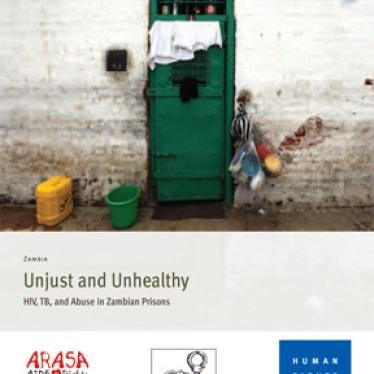Kenya has shown an impressive commitment to combating HIV and tuberculosis. It developed an ambitious programme for voluntary HIV counselling and testing, and was the first country in sub-Saharan Africa to reach global targets for both detecting and treating TB.
But one group of people has been neglected in Kenya's fight against infectious disease: prisoners. Prison health is public health.
Prisoners, and prison staff, come and go from Kenyan prisons every day, bringing with them potentially infectious diseases in both directions. Ignoring prisoner health undermines Kenya's broader health goals.
As in many countries in Africa, conditions inside Kenya's prisons are dangerously unhealthy. In July 2008, a Ministry of Home Affairs report on prison conditions estimated that 46 inmates die every month because of dirty and crowded conditions and a lack of adequate health care.
These are needless deaths, preventable and treatable. These conditions can effectively condemn even petty criminals and those awaiting trial to death.
A report about prison conditions in Zambia released on April 27 by Human Rights Watch, the Aids and Rights Alliance for Southern Africa, and the Prisons Care and Counselling Association described how poor prison conditions affect an entire nation's health.
In compiling that report, we spoke with almost 250 prisoners in six Zambian prisons.
Prisoners described to us the terrible conditions in which they live. Prisons are so overcrowded that inmates sometimes sleep in shifts, or seated.
Corporal punishment is common. Food is inadequate, and prisoners with HIV and TB have difficulty taking medications because of their hunger. In many prisons, prisoners are given no soap to wash themselves, nor clothes to wear.
Given the high HIV prevalence, the threat of TB and drug-resistant TB in cramped, unventilated cells is all the more serious.
In Zambia, HIV prevalence in prisons was last measured at 27 per cent - almost double the overall adult prevalence in the country - and TB rates in prisons are over 10 times those in the community.
In Kenya, according to the Kenya Prisons Service, one in 10 prisoners is infected with HIV, and while TB rates are largely unmeasured, one recent study found that TB prevalence in one of Kenya's prisons was seven times higher than that of the general population.
This combination of high HIV and TB prevalence in prisons can be deadly. Worldwide, TB is responsible for nearly one in four deaths from AIDS.
What can be done to curb the spread of HIV and TB in prisons in sub-Saharan Africa, and to protect both prisoner health and the health of the communities to which prisoners return? First, voluntary HIV testing, TB screening, and improved health care services need to be made available in all prisons.
But prevention in prison is also key. HIV is transmitted in prisons for a simple reason: sex. Preaching only abstinence to prisoners, like preaching only abstinence outside of prisons, does not work to prevent HIV transmission. Instead, comprehensive HIV education and condoms need to be available.
In addition, juveniles need to be separated from adult prisoners to reduce rape and coercion, and minimum nutritional standards should be guaranteed to help prevent prisoners from being forced to barter sex for food.
Inside prisons, just as outside them, there is a choice in the response to Aids. Governments can adopt pragmatic, effective HIV approaches that respect human rights, or they can pursue ineffective, ideological approaches that violate human rights and also health.
Kenya's national HIV strategy has identified prisoners as a vulnerable group, and Kenyan officials have acknowledged that sex occurs among prisoners and that a significant number of HIV infections are occurring inside prisons.
Yet, the simplest solution - making condoms available - is not being implemented. The result is that people are becoming infected and dying.
"These conditions defeat the purpose of rehabilitation," Winston, a 35-year-old inmate in Zambia's Mukobeko Maximum Security Prison, told us.
Of course, prison is intended to punish as well as to rehabilitate, but prisons should not sicken individuals and communities.
Properly addressing the transmission, testing, and treatment of HIV and TB - and providing comprehensive access to prevention, including condoms - is crucial to achieving Kenya's HIV and TB goals.
Joseph Amon is the director of the Health and Human Rights division at Human Rights Watch







